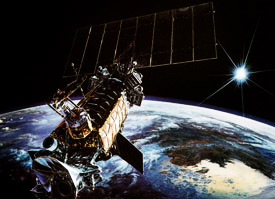Oct 19 2009
The Defense Meteorological Satellite Program (DMSP) F-18 Block 5D-3 spacecraft, built under contract for the U.S. Air Force by Lockheed Martin (NYSE: LMT), was launched this morning from Vandenberg Air Force Base, Calif. at 9:12 am PDT.
 DMSP satellite
DMSP satellite
"After several years of building, integrating, upgrading and testing DMSP F-18, our third Block 5D-3 spacecraft, it was enormously satisfying to see this morning's launch and hear that we have a healthy satellite on orbit that will carry out its vital mission of supporting our warfighters," said Sue Stretch, Lockheed Martin DMSP program director. "Our partnership with the Air Force dates to the very beginning of the DMSP program with a common goal of ensuring that commanders have access to environmental data critical to the preparation and execution of military operations."
The Block 5D-3 series accommodates larger sensor payloads than earlier generations. They also feature a larger capability power subsystem; a more powerful on-board computer with increased memory -- allowing greater spacecraft autonomy -- and increased battery capacity that extends the mean mission duration. Starting with F-17, the attitude control subsystem has also been enhanced with the integration of a second inertial measurement unit using ring laser, versus mechanical, gyros to provide greater precision pointing flexibility.
DMSP is used for strategic and tactical weather prediction to aid the U.S. military in planning operations at sea, on land and in the air. Equipped with a sophisticated sensor suite that can image visible and infrared cloud cover and measure precipitation, surface temperature, and soil moisture, the satellite collects specialized global meteorological, oceanographic, and solar-geophysical information in all weather conditions. The DMSP constellation comprises two spacecraft in near-polar orbits, C3 (command, control and communications), user terminals and weather centers. DMSP F-18 was launched on a United Launch Alliance Atlas 5 rocket.
Following DMSP F-18, two satellites remain to be launched and are maintained at Space Systems' operations in Sunnyvale, Calif. for storage, functional testing, and upgrading. The spacecraft are shipped to Vandenberg for launch when requested by the Air Force. Since 1965, 37 Lockheed Martin DMSP satellites have been launched successfully by the U.S. Air Force. Now in its fourth decade of service, the DMSP has proven itself to be a valuable tool in scheduling and protecting military operations on land, at sea and in the air. The Space and Missile Systems Center at Los Angeles Air Force Base, Calif. manages the DMSP program.
Lockheed Martin Space Systems Company, a major operating unit of Lockheed Martin Corporation, designs and develops, tests, manufactures and operates a full spectrum of advanced-technology systems for national security and military, civil government and commercial customers. Chief products include human space flight systems; a full range of remote sensing, navigation, meteorological and communications satellites and instruments; space observatories and interplanetary spacecraft; laser radar; ballistic missiles; missile defense systems; and nanotechnology research and development.
Headquartered in Bethesda, Md., Lockheed Martin is a global security company that employs about 140,000 people worldwide and is principally engaged in the research, design, development, manufacture, integration and sustainment of advanced technology systems, products and services. The corporation reported 2008 sales of $42.7 billion.